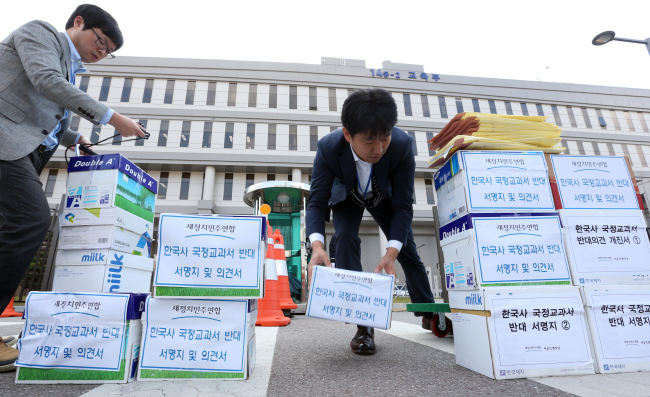The government said Monday it would expedite the schedule to confirm reinstatement of government-issued history textbooks from Thursday to Tuesday, prompting a flurry of protests with the main opposition party vowing a boycott of parliamentary sessions.
Prime Minister Hwang Kyo-ahn and Education Minister Hwang Woo-yea will hold a briefing at Seoul Government Complex at 11 a.m. Tuesday, according to the Prime Minister’s Office, where the government will confirm the policy to revise the publication system for secondary history education.
 |
Education Ministry officials move boxes containing petitions gathered and sent by the main opposition New Politics Alliance for Democracy opposing the government’s reinstatement of state-authored history textbooks in front of the ministry building in Sejong City on Monday. (Yonhap) |
The Education Ministry has been collecting public opinion on the issue for 20 days, under Korean law that stipulates that the government is to give notice in advance on policy changes or plans that could inconvenience the public.
The abrupt change in schedule indicated that the ruling Saenuri Party and President Park Geun-hye are seeking to make official the much-disputed policy, which has been at the center of a political and social standoff.
Rep. Kim Jung-hoon of the Saenuri Party’s policy committee urged the ministry on Monday to “finish confirmation as soon as possible to end political and ideological confusion, and focus on creating the correct history textbook.”
The main opposition New Politics Alliance for Democracy, whic has strongly opposed the state textbook policy, said it would launch a sit-in protest from Monday evening and boycott the plenary session at the National Assembly Tuesday in light of the news.
Rival parties and the public have been split over the government’s resolve to implement what it called a “correct history textbook,” and some of its tactics in pushing the plan.
Last Sunday, the NPAD raised suspicion that the ministry was running a secret team on direct orders from the presidential office. The ministry acknowledged the existence of such a team, but said there was nothing illegal in its nature.
Three NPAD lawmakers visited the ministry complex around 2 p.m. to hand over a petition against the state textbook and asked why Minister Hwang Woo-yea had turned down their request for a meeting, pointing out that his official schedule remained empty for the day.
The ministry’s school policy office head Kim Dong-won, who accepted the petition on Hwang’s behalf, said Hwang was attending a personal appointment.
The lawmakers also echoed an allegation made by a local media outlet last week that the ministry’s team tasked with collecting public opinion was deliberately ignoring calls. “(The ministry) could not be reached via fax nor phone, and it ignored the parliament’s demand to receive suggestions online,” said Rep. Do Jong-hwan of the NPAD.
He also said that over 1 million people have signed a petition against the state textbooks, some 400,000 of which were delivered to the ministry.
“(The ministry) should think about why so many people are against the idea. If it pushes ahead, even more people will protest, which I worry will cripple the education system in general,” he said.
The Saenuri Party, on the other hand, delivered a written opinion welcoming the state textbook policy. Both the government and the ruling party had maintained that the content of current textbooks ― authored by eight private publishers ― are biased in favor of the leftists and is “self-depreciative” of Korean history.
“(The textbooks) derogate the efforts of the former generation, who worked to write the proud history of Korea. ... The narrow-minded view of history makes children think that ‘our country is full of problems’,” the party said.
The news of confirmation came a little over an hour after Kim Dong-won promised the lawmakers that all petitions will be carefully considered before the ministry reaches a decision, fueling criticism from the opposition that the government gathering public opinion was merely a formality.
The government has also asked regional education offices to punish the teachers who denounced the state textbook policy. Korean law states that civil workers ― which include teachers ― cannot take politically motivated action.
Local Kyunghyang Shinmun claimed Monday that the ministry had contacted college chiefs to get them to support the policy. The ministry denied the allegations.
NPAD Rep. Bae Jae-jung, meanwhile, pointed out that the ministry has already spent 2.2 billion won ($1,930) on promoting the state textbook policy, which is about twice its annual PR budget.
The latest poll results of by Gallup Korea ― announced last week ― showed that 49 percent of Korean adults were against the policy and 36 percent supported it. The rest remained unsure.
It also showed that the president’s approval and disapproval ratings were both at 44 percent, and the biggest reason for disapproval ― 31 percent ― was the state textbook.
By Yoon Min-sik (
minsikyoon@heraldcorp.com)








